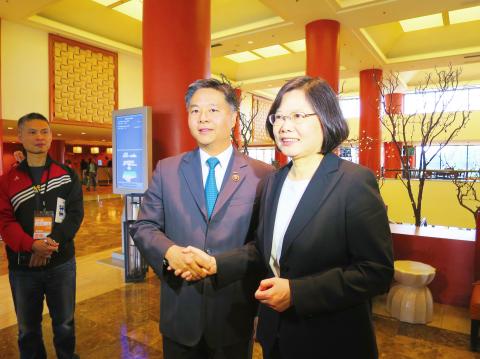Democratic Progressive Party (DPP) Chairperson Tsai Ing-wen (蔡英文) on Saturday held a closed-door forum with eight US academics in Los Angeles to discuss maintaining the cross-strait “status quo.”
Most attendees said the DPP presidential candidate’s proposals made sense, said Clayton Dube, director of the US-China Institute at the University of South California (USC) Annenberg School for Communication and Journalism.
However, Dube declined to elaborate on what Tsai discussed.

Photo: Chen Hui-ping, Taipei Times
DPP Secretary-General Joseph Wu (吳釗燮) told reporters that “what was discussed will not be made public.”
Asked the US’ view of the so-called “1992 consensus,” Dube said the US accepts whatever is agreed upon and conducted in peaceful means between Taiwan and China.
Stanley Rosen, a USC political science professor and member of the US-China Institute, and Wang Feng (王豐), a sociology professor at the University of California at Irvine, also attended the forum.
Tsai has previously said that maintaining the cross-strait “status quo” means maintaining peace, so both sides can pursue development amid peace and stability.
She has declined to support the “1992 consensus,” saying that the term became popular only in 2000, adding that even those who were involved in the Hong Kong negotiations in 1992 have expressed different views about it, as has former president Lee Teng-hui (李登輝).
Beijing on Wednesday last week said that Tsai had to clarify what she meant by “maintaining the status quo” if she were elected.
US Deputy Assistant Secretary of State for East Asian and Pacific Affairs Susan Thornton on May 21 said that, regardless of who wins Taiwan’s presidential election next year, the US “hopes to continue our close cooperation, and it must be said that an important ingredient of that close cooperation in recent years has been the stable management of cross-strait ties.”
Tsai arrived in Los Angeles on Friday for a six-city US tour.
On Saturday, she met with US Representative Ted Lieu (劉雲平), a Taiwanese-American whose grandparents still live in Taiwan, to discuss labor-related issues and the Trans-Pacific Partnership.
At a dinner party hosted for her by Taiwanese expatriates, Tsai said the focus of her cross-strait policy is maintaining the “status quo,” accenting that peaceful development of cross-strait ties would be her administration’s main goal if she were elected.
“I am not here for an interview,” she said, adding that the common language between Taiwan and the US is “democracy, democracy and democracy.”
The “1992 consensus” refers to a supposed tacit deal between the Chinese Nationalist Party (KMT) and Beijing that each acknowledges there is “one China,” with each side having its own interpretation of what “China” means.

SECURITY: As China is ‘reshaping’ Hong Kong’s population, Taiwan must raise the eligibility threshold for applications from Hong Kongers, Chiu Chui-cheng said When Hong Kong and Macau citizens apply for residency in Taiwan, it would be under a new category that includes a “national security observation period,” Mainland Affairs Council (MAC) Minister Chiu Chui-cheng (邱垂正) said yesterday. President William Lai (賴清德) on March 13 announced 17 strategies to counter China’s aggression toward Taiwan, including incorporating national security considerations into the review process for residency applications from Hong Kong and Macau citizens. The situation in Hong Kong is constantly changing, Chiu said to media yesterday on the sidelines of the Taipei Technology Run hosted by the Taipei Neihu Technology Park Development Association. With

CARROT AND STICK: While unrelenting in its military threats, China attracted nearly 40,000 Taiwanese to over 400 business events last year Nearly 40,000 Taiwanese last year joined industry events in China, such as conferences and trade fairs, supported by the Chinese government, a study showed yesterday, as Beijing ramps up a charm offensive toward Taipei alongside military pressure. China has long taken a carrot-and-stick approach to Taiwan, threatening it with the prospect of military action while reaching out to those it believes are amenable to Beijing’s point of view. Taiwanese security officials are wary of what they see as Beijing’s influence campaigns to sway public opinion after Taipei and Beijing gradually resumed travel links halted by the COVID-19 pandemic, but the scale of

A US Marine Corps regiment equipped with Naval Strike Missiles (NSM) is set to participate in the upcoming Balikatan 25 exercise in the Luzon Strait, marking the system’s first-ever deployment in the Philippines. US and Philippine officials have separately confirmed that the Navy Marine Expeditionary Ship Interdiction System (NMESIS) — the mobile launch platform for the Naval Strike Missile — would take part in the joint exercise. The missiles are being deployed to “a strategic first island chain chokepoint” in the waters between Taiwan proper and the Philippines, US-based Naval News reported. “The Luzon Strait and Bashi Channel represent a critical access

Pope Francis is be laid to rest on Saturday after lying in state for three days in St Peter’s Basilica, where the faithful are expected to flock to pay their respects to history’s first Latin American pontiff. The cardinals met yesterday in the Vatican’s synod hall to chart the next steps before a conclave begins to choose Francis’ successor, as condolences poured in from around the world. According to current norms, the conclave must begin between May 5 and 10. The cardinals set the funeral for Saturday at 10am in St Peter’s Square, to be celebrated by the dean of the College